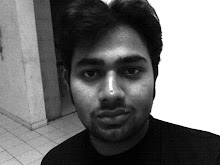This is one of the facts that all of us are pretty much aware of, though no one speaks about it. I guessed it was time someone acknowledged it. All this time we keep reading about doing things, convincing ourselves that if we stick to the proposed algorithm religiously, we’ll achieve the task all by ourselves. Such a myth is never really challenged as long as we don’t get the chance to test the algorithm practically.
Indeed, we rarely get the opportunity to test the taught doctrines “practically”. When we do, we fail and it is then that we realise that something was wrong somewhere. The thing is, we are quite gullible. We easily believe what we are made to believe.
Why is it so? Is it that we were born like this? No. It’s just that we were brought up in a way that causes us to fall flat before the eloquence of those who instruct us. Its nature vs. nurture and nurture wins here, hands down. In an engineer’s terms, our hardware is sound, it is the software installed that is obsolete and bugged.
Humans have a way of choosing the EASY WAY OUT. We believe in theories proposed by others without ever questioning their authenticity because we don’t want to tire our brains by thinking. We don’t like pushing our faculties of imagination. And besides, those who use their imagination find themselves alone, and against a cult of those who take the “easy way out”. And in the altercation between ideas, it is the infant that always perishes, for its adversary has been spreading its roots in the minds of its preys like a parasite for many centuries. In the battle of experience and age, the former always crushes the latter.
I’ll relate a few futile attempts of mine and others to achieve things they said were achievable through adherence to some protocol.
Salt Analysis- Classes XIth and XIIth
All science students who have studied in the mentioned period must be aware of the procedure of identifying the radicals present in a chemical compound. The procedure was a standard one and could be found in all chemistry books. But only 5% of the students could actually achieve the task at hand, though many knew how to proceed. The reason: theoretical knowledge alone was insufficient. There were many practical considerations that had bearing upon the method.
Expansion work in a physical process
Almost all chemistry teachers who prove that expansion work W=PêV start with the definition of work that physics gave us, W= F. S. They say, in the case of gases, it is the Atmospheric pressure that forces the gas to stay confined in a particular volume, and it is this force that is to be overcome which causes pressure P to come into the equation. And they conclude that this formula can even be used to find the work when some solid melts, say ice. I believed that this inference could not be drawn. Solids are not gases. They have a fixed volume. They don’t occupy the entire volume of the container they are in. It is not the force exerted by the external pressure but their intermolecular forces that hold their molecules together. So it is the intermolecular forces that need to be overcome and therefore external pressure must not come into the equation. We need another equation in this case.
I tried explaining this to several teachers but all they said was I was not qualified to question such widely acclaimed statements. And to pass the exams I had to give in.
Deccan Chargers- the best IPL team on paper
Cricket Cognoscenti had claimed that T-20 was a format wherein hitting only mattered. They added it was a batsmen’s game and teams having great hitters who could survive 20 overs would win the tournament hands down. Deccan Chargers, with its batting virtuosos, namely Gilchrist, Gibbs, Afridi and Symonds was hailed as the winner long before the tournament actually started. But we all saw what happened.
There are more examples to share but I am tired of typing. I am virtually writing this on paper and it seems easy. But I swear it is a lot tougher to live your life following the things I say.
I have a last question to ask myself. Do I live my life on paper? And I have an answer. No Sir I don’t. And I have a logical deduction. To live life out there we need to think, and find out rather than assume. FIND OUT, DON’T ASSUME. At least I can say so on paper.
Saturday, August 2, 2008
Subscribe to:
Post Comments (Atom)




No comments:
Post a Comment